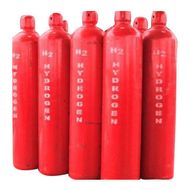Improving Solar Power Efficiency

With all the problems surrounding Eskom in recent years I have invested in solar panels mainly to protect computors from power outages. After testing the system for a while I have discovered that a lot of the solar panel generation is wasted. The system I have, charges batteries during the daytime, however once the batteries reach a voltage of 27 volts the system merely maintains that voltage and very little power is actually going into the batteries. The result is that of the potential of 1000 watts, less than 250 watts is being consumed by the system. This means that there is excess capacity of 750 watts for at least 50% of daylight hours. That is an awfull lot of power to waste.
I have therefore been conducting some experiments to see what can be done to utilise at least some of this excess power. One of the things I have been trying is the production of hydrogen via electrolysis. Currently with my rudimentry equipment I have found that I can produce about 1 litre of hydrogen per hour (at atmospheric pressure). To produce this my equipment uses 5 amps at 50 volts DC, which equates to around 250 watts. I suspect that with better equipment and further experiments this production can be increased. As a byproduct in this process I have found that the electrolyte also heats up, I have found that in 2 hrs the electolyte gains about 40 degrees centigrade (about 6 litres electrolyte). This heat can also be used in various ways but this would require futher research.
The hydrogen produced by this system will be able to be used for cooking in gas apliances and can even be used in internal combustion engines. It could also provide part of the solution to the problem of solar energy not being productive at night and during low sunlight conditions as hydrogen can be stored for later use. Care should be taken to ensure that the hydrogen is pure and not mixed with air or oxygen since oxygen and hydrogen mixed is a very explosive mixture. The production rate may seem low, but it must be remembered that it is utilizing power which would otherwise go to waste.
The argument agaist hydrogen as a fuel has always been that the production costs outweigh the usefull energy produced. Since this system is using excess energy the cost to produce is almost zero, which certainly makes it a viable alternative to LP gas. I would be greatly interested to hear what others have to say on this subject, I see it as a potential bonus for those already running on solar power and also for the country as a whole. I might also add that the electrolyte solution contains no harmfull ingredients which would harm the environment, but it doesn't taste too good.

Leave a comment
It's great if you can use it for cooking but if it cannot be mixed with oxygen how will you control it before you get to light it?
